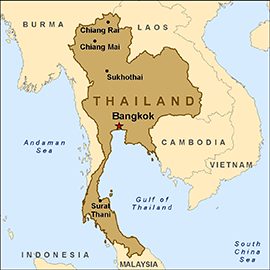Slavery in the Thai Seafood Industry

It is not a new revelation that slavery plagues the global food system. Men, women and children are enslaved in the fishing industry of Ghana, banana plantations in South America and tomato farms in the United States. Yet a recent investigative report by The Guardian that revealed the depth of the slave labor used in shrimp production in Thailand has caused public outrage in the U.K and U.S. The American and British public seem less shocked that slave labor is used in the global production of food and more incensed that major Western corporations are working with and financing companies that enslave and abuse their employees. The six-month investigation conducted by The Guardian exposed that men are held against their will on boats off the coast of Thailand and the shrimp that they catch are sold into the top four global retailers: Wal-Mart, Carrefour, Costco and Tesco.
The Department of State’s Trafficking in Persons 2014 Report (TIP), caught on early to Thailand’s slave driven seafood market and down-graded the Southeast Asian country from a Tier 2 to the lowest Tier 3 ranking—a distinction that places the country in the same category as North Korea, Syria and the Central African Republic. Even with the TIP report and the Guardian investigation suggesting otherwise, the Thai fishing industry refuses to acknowledge any wrongdoing with it’s official spokesperson telling the press: right now I can confirm that there is not any use of illegal labor. The Thai government was equally as non-apologetic claiming that the U.S downgrade does not match the reality or facts regarding the Thai government’s efforts. As a Tier 3 country, President Obama now has 90 days to determine if Thailand and the rest of the 23 countries on the list will face sanctions.
The country of Thailand and the fishing industry can deny the use of slave labor but the media is flooded with interviews and stories of survivors that make it difficult not to believe. The Environmental Justice Foundation report stated that the Thai fishing industry is riddled with violence towards workers and that 59 percent of workers surveyed had witness murder. Many of the victims are trafficked from Burma into Thailand and sold into slavery on the Thai fishing boats where they are forced to work up to 20 hours a day. The Thai government estimates 300,000 people work in its fishing industry, 90 percent of whom are migrants vulnerable to being duped, trafficked and sold to the sea. Thailand has a very labor based economy without enough workers to support the country’s needs which leads to companies finding cheap labor from neighboring Burma, Laos and Cambodia. The bigger American and UK based companies further down the supply chain never ask where these laborers come from or if they are consensual workers. While the revelation of the enslavement of workers in the Thai fishing industry has outraged many, hopefully it will also be a call to action to stop slavery in the global food system.
